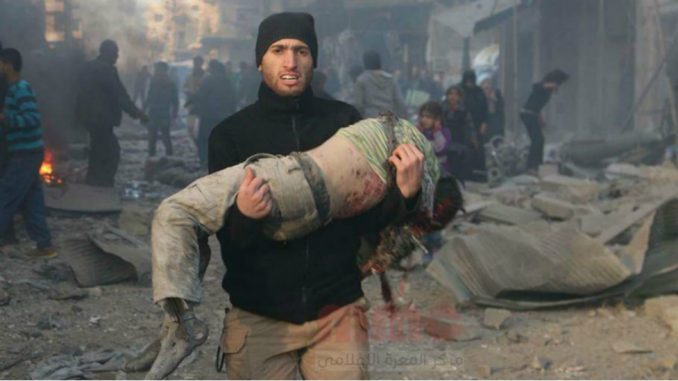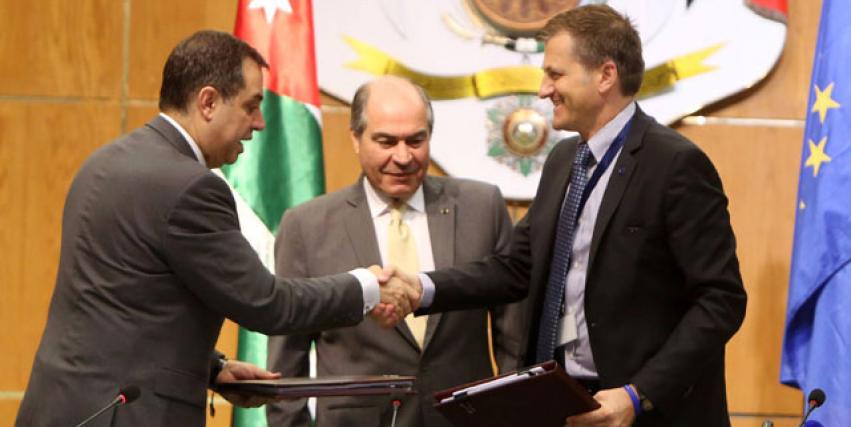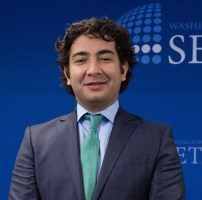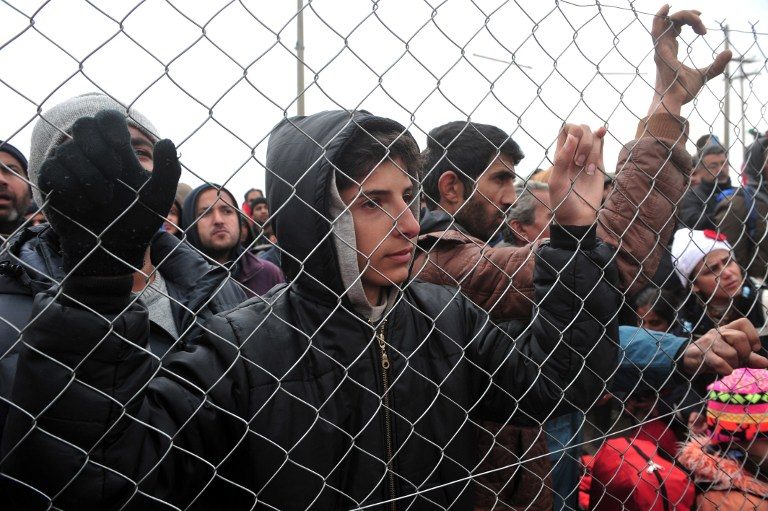
Idlib has turned into the last frontier between Syrian pro-regime forces and opposition forces, as well as their respective international allies.
US special envoy for Syria engagement and the fight against the Islamic State group, James Jeffrey, said Washington is “very, very worried” about the Syrian regime’s assault – backed by Russia – on Idlib province.
Jeffrey called on Moscow to help halt the bloody assault that has uprooted hundreds of thousands of civilians and killed hundreds.
“This is a dangerous conflict. It needs to be brought to an end. Russia needs to change its policies,” Jeffrey said.
This comes as the Syrian regime and Russian forces on Wednesday launched new attacks aimed at capturing Idlib City.
Syrian opposition military sources told The New Arab’s Arabic-language service that Russian planes were bombing the road between Idlib City and the village of Qumenas, six kilometers southeast of the provincial capital.
Regime forces on Tuesday advanced to within eight kilometers of the city, having captured the village of Nayrab one day after opposition forces drove them out.
Regime military sources said that they were trying to advance from Nayrab to Qumenas amid heavy fighting with the opposition.
The sharp escalation of violence prompted the US, UK and France called for an urgent UN Security Council meeting on Thursday to discuss the situation in Idlib.
“We’re seeing not just the Russians but Iranians and Hezbollah actively involved in supporting the Syrian offensive. We don’t know whether the offensive is just to get to the M4-M5 road, or it may continue further,” Jeffrey said, in reference to the strategic highways connecting Syria’s Aleppo to Hama and Latakia on the Mediterranean coast and the other linking Aleppo and Damascus.
Jeffrey said Moscow could change its policies and meet the requirements of the international community without ousting Assad. “Those requirements are not unreasonable. … They require a change in that (Assad) government’s behavior. That government would not survive a week without the Russian assistance.”
Moscow’s presence complicates matters. Following the partial withdrawal of US troops from northern Syria, Moscow has increased its own military presence in the northeast and had entered into de-confliction agreements between the two sides.
But Jeffrey said on Wednesday there have been more incidents of Russia’s violating the terms of de-conflict agreement in what he characterised as an attempt to challenge the US presence in there.
“We’ve seen a limited number of occasions where… they’ve tried to come deep into the area where we and the [Syrian Democratic Forces] are patrolling well inside the basic lines we have sketched,” he said.
“Those are the ones that are worrying me.”
He said that while the numbers of such incidents were not very high, they were on the rise.
“This is troubling,” he said, and called on Moscow to adhere fully to the de-conflict agreements made with the US.
EU calls for end to Idlib bombardment
Top EU officials urged on Thursday for “bombings and attacks on civilians” in northwest Syria to stop.
EU foreign policy chief Josep Borrell and Janez Lenarcic, the European commissioner for crisis management, said all parties should respect international humanitarian law, including granting access for humanitarian aid and protecting civilians.
In a joint statement, Borrell and Lenarcic said the “extraordinary human suffering” of the people near the province of Idlib was “unacceptable.”
The EU pledged to continue to provide humanitarian assistance to support the most vulnerable people inside Syria and in neighboring countries.
In the statement, they stressed that hundreds of civilians had been killed with more than 500,000 fleeing their homes over the past months due to intensified military operations.
They added that attacks continued against civilian targets “in densely populated areas, medical facilities and settlements for internally displaced people,” with displaced people suffering poor living conditions amid harsh winter conditions while unable to meet even their basic needs.
Idlib has been a stronghold of opposition and anti-government armed groups since the outbreak of the Syrian civil war in 2011.
It is currently home to some four million civilians, including hundreds of thousands displaced in recent years by regime forces throughout the war-weary country.
Despite a cease-fire deal brokered by Turkey and Russia in 2018 to turn Idlib into a de-escalation zone, the Syrian regime and its allies have consistently broken the terms of the cease-fire, killing at least 1,300 civilians since the agreement.
Russian delegation to visit Turkey over Idlib attack
A Russian delegation is expected to visit Turkey in the wake of a Syrian regime attack on Turkish troops in Idlib, Turkish foreign minister said on Thursday.
Speaking to the reporters in the Azerbaijani capital Baku which he visited to attend a Turkic Council, Mevlut Cavusoglu said the Turkish and Russian leaders will also meet if there is a need.
The Russian delegation’s expected visit comes after Monday’s attack in Idlib, northwestern Syria, that martyred seven Turkish soldiers and one civilian contractor working with the Turkish military.
Turkey urges Russia to stop Syrian govt attacks in Idlib
Turkey expects Russia to stop the Syrian government’s attacks in the northwestern region of Idlib immediately, Foreign Minister Mevlut Cavusoglu said on Thursday, adding that Ankara needs to work with Moscow to resolve problems in the region.
Turkey’s President Tayyip Erdogan has threatened to drive back Syrian government forces in Idlib unless they withdraw from the region by the end of month, after an attack by Syrian forces killed eight Turkish military personnel in Idlib on Monday.
Speaking to reporters in Baku, Cavusoglu also said in televised comments that a Russian delegation would come to Turkey to discuss Idlib and that Erdogan may hold a meeting with Russian President Vladimir Putin after those talks if necessary.



